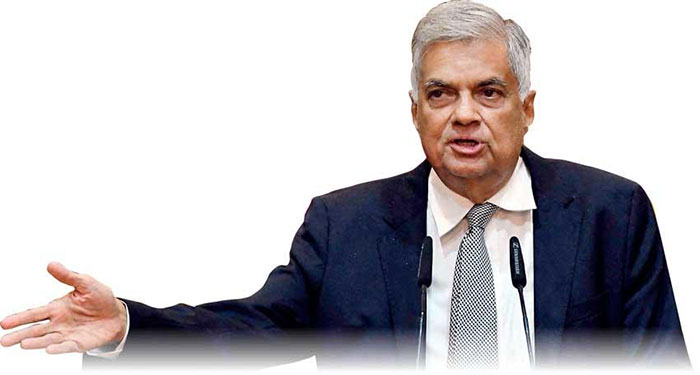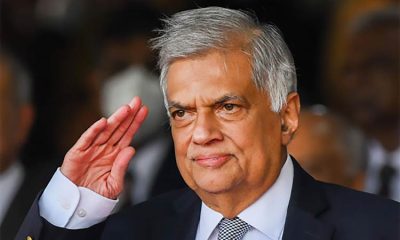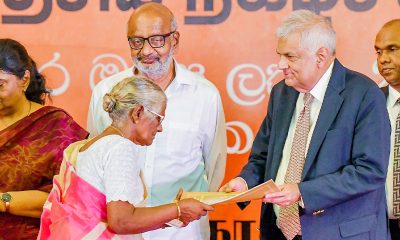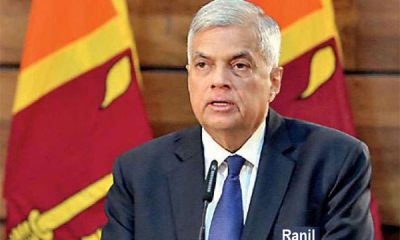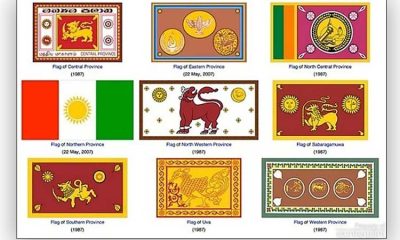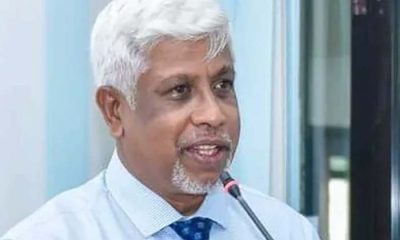Features
Let the Countdown Begin: Parliamentary Elections in March 2024
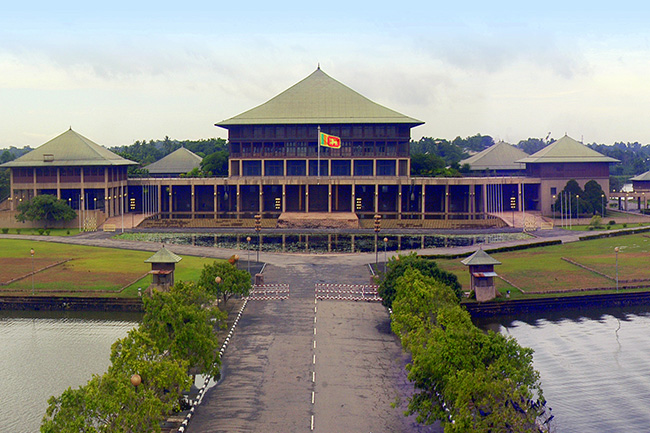
by Rajan Philips
President Wickremesinghe has now made repeated assurances that the presidential and parliamentary elections will be held in 2024. Financial allocations for the two elections were also announced in parliament. Parliamentary elections are expected to come first, apparently in March 2024, according to news reports citing sources close to the President. Let us assume that the sources are correct and start the political countdown before the official call is made early in the new year. It is going to be a 100-day countdown.
A parliamentary election in March will be the first parliamentary election to be held before the presidential election since the twosome began their co-existence in 1982. In that year of disgrace, President Jayewardene conducted and won the country’s first presidential election, calling the election before his first, appointed, term was over, courtesy of the Third Amendment to the Constitution. He then went on to cancel the parliamentary elections that were due that year by staging an undemocratic referendum and doubled the life of an old parliament.
The purpose of advancing the presidential election was to give himself (JRJ) time to manipulate the timing of parliamentary election. This was on top of the arbitrary power that the constitution gave the executive to dissolve parliament any time after one year of its election. This power of dissolution is an unusual, if not unique, constitutional power vested in the executive over the legislature.
So much for the much vaunted separation of powers. The 19th and 20th Amendments have somewhat limited this power, but even what is left of it privileges the executive over the legislature.
President Wickremesinghe will be exercising the presidential power of dissolution to dissolve parliament and call for elections in March 2024, before they are due more than a year later in 2025. In 1982, President Jayewardene did not want to let go of the massive majority he had in the parliament elected in 1977. He kept it going through the referendum chicanery. No one wants this parliament to keep going except the Rajapaksa MPs. The prospect of its dissolution in March is as good as it can get in the circumstances.
Ranil’s Last Hurrah
So far, President Wickremesinghe has been refusing to use the power of dissolution – in order to delay elections. Not anymore, we hope. Now it makes sense for him to dissolve parliament and have parliamentary elections before the presidential election. If the presidential elections were to come first, Ranil Wickremesinghe would likely have faced two unwelcome choices: not to run as a candidate, or to run and lose. That will be the end of his presidency and he would be long gone by the time the next parliamentary elections are held, as they are due, in 2025.
By calling parliamentary elections in March, Mr. Wickremesinghe will have the opportunity and the power to first ‘preside’ over the election in whatever way he can, and then to appoint the Prime Minister and cabinet of Ministers from among the MPs of the newly elected parliament. Neither of which he would probably be able to do if the presidential elections were to go first. In the most likely situation of no single party winning by a clear majority in the next general elections, President Wickremesinghe will be well positioned to call the shots as he pleases, and all within his constitutional powers. But not quite every shot as he might please.
First, the President should not overplay his hand. For unlike in Thailand, it would be counterproductive to try to thwart the results of a popular parliamentary election through clever-by-half executive means. Second, he has a massive trust-deficit with practically every political party in parliament other than an insufficient number of Ministers and MPs who would like to see him continue as President for their own self-serving ends. It will all depend on how the President conducts himself during the parliamentary election.
If he were to take sides or take to machinating between MPs and Parties to forge a new alliance for the election, he had better make sure that such an alliance would be a winning alliance. Otherwise, and that is more likely to be the case, he would be a goner by the time his (really Gota’s) term is up. On the other hand, if he were to exercise enlightened selfishness and stay above the electoral fray, he may have a chance to form a consensus government in the new parliament and take yet another shot at extending his political life. But that will be quite a long shot even for a man who is known for playing the long game.
The revelations that TNA MP Sumanthiran recently made in parliament, about the manner in which Ranil Wickremesinghe broke opposition consensus and broke ranks to become Gotabaya’s crisis Prime Minister, are quite damaging. Add to that, President Wickremesinghe’s recent shenanigans with the Judiciary, the Constitutional Council, and with the appointment of the IGP, have left him thoroughly discredited and untrustworthy. Adding injury to insult, he has appointed the universally lampooned and reviled Deshabandu Tennakoon as the new IGP for a three month term. The upshot of all of this is that no one contesting the next parliamentary election would like to have anything to do with President Wickremesinghe. Other than the irrationally selfish.
Framing the Elections
At the same time, there is no shortage of irrationality or selfishness in Sri Lankan politics, and going by Mr. Wickremesinghe’s long past, he is not going to remain quiet or neutral as President in the next parliamentary election. He may even pull up the abolition card and play it one more time and tack a referendum question on abolition to the vote at the parliamentary election. Whatever Ranil Wickremesinghe may or may not do, the elections should not be about Ranil Wickremesinghe, and he should not be allowed to frame the election.
The elections should be about the possibilities and the potentialities for a Sri Lanka that is finally becoming free from two decades of Rajapaksa-Wickremesinghe political monopoly. The elections will also be about how Sri Lanka is going to be led out of the economic pits by those now vying for power. Then there are carryovers all the way from the twentieth century which have not been addressed but only aggravated during the Rajapaksa yugaya of this century.
The election will be framed by the dialectic of the contenders for power and/or parliamentary seats, and their positions on the manifold issues and problems that are preoccupying the people.
The SJB and the NPP have been calling for elections for almost two years and now they will get their chance to show what they are capable of. The remnants and rumps of the historically governing parties – the UNP, the SLFP and the SLPP will not have any significant identity of their own, but they may not all go into alliances with either the SJB or the NPP. Also, in a parliamentary election there is space for political parties and individuals to enter into multiple alliances.
It will be interesting to see who will be allying with the SJB, and if any of the recognized political parties will be joining the NPP/JVP formation. Any of the Sinhalese parties who are not part of either the SJB or NPP alliances, will not likely be significant players in the election, but may gain specific weights after the election as contributors to a governing majority in return for ministerial portfolios. If it were the first-past-the-post system, the Rajapaksas would probably be wiped off the electoral slate, but some of them could still manage to return because of proportional representation and preferential voting.
The political parties of the Sri Lankan Tamils, Muslims and the Indian Tamils will have their respective, and in some cases overlapping, universes, with their corresponding national overtones. The TNA will likely have to go through a leadership change before the election which may create internal rivalries even as it tries to ward off external rivals especially in the Northern Province. In the East, Sri Lankan plurality will be electorally reproduced with proportionate returns of Tamil, Sinhalese and Muslim MPs.
Political parties of the Indian Tamils, as well as Muslim political parties, have usually joined one or the other of the two main contending alliances. Where they will land this time remains to be seen. Some are with the SJB, while those who are with the current ‘government’ of President Wickremesinghe may have to find new suitors if they are to be relevant after the elections.
Again, it will be interesting to see if the JVP would be able to attract and accommodate any of the minority political parties under its NPP umbrella. It is known that the JVP and especially its leader Anura Kumara Dissanayake have excellent working relationship with many of the Tamil, Muslim and Indian Tamil political leaders, but whether the JVP would be able to draw them into a formal alliance is one of the crucial questions that will be answered during the countdown period.
Even a broadened NPP alliance will not be broad enough if it fails to include one or more of the minority political parties. On the other hand, an NPP alliance that includes minority political parties would send a powerful signal that the JVP/NPP has come of age electorally. Anything less would only mean that the JVP continues to immature in spite of age.
The countdown and the campaign will see shifting focuses around issues along with competing defenders and detractors. The main issues and those that matter are on people’s minds and in their still harrowing living and medical experiences. Then there are issues that preoccupy the pundits and elicit editorial commentaries. How will political parties and alliances respond to them? As well, the formation of political alliances and groupings will be implicated by their positions on the issues and problems facing the country, and will in turn implicate how different issues or privileged or prioritized.
The economic crisis will provide an arresting backdrop to the election campaign. President Wickremesinghe presented his budget on November 13, outlining his purported plan to take Sri Lanka out of the economic crisis. The very next day, the Supreme Court came down with its ruling on the fundamental rights applications against decision makers in the Gotabaya Rajapaksa Administration. The Court apportioned blame for decisions made wrongfully by elected and unelected officials that precipitated Sri Lanka’s worst and its only “man-made” economic crisis.
The voters deserve to know where the SJB, the NPP and everyone else running for election stand on the economy – the current crisis, its perpetrators, and a plausible way out. The upcoming election will also provide a new opportunity for the Catholic Church hierarchy to reiterate the yet unanswered questions about the perpetrators of the 2019 Easter Sunday tragedy. There are shortages of all kinds in Sri Lanka. But there is no shortage of election issues.
Features
Inescapable need to deal with the past
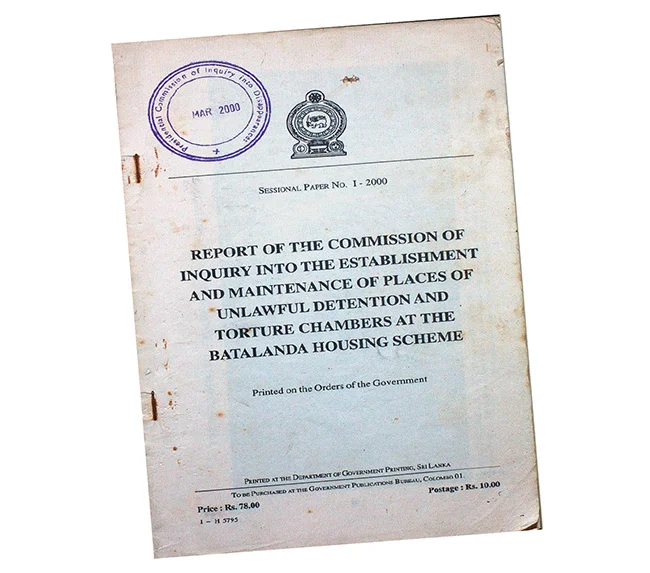
by Jehan Perera
The sudden reemergence of two major incidents from the past, that had become peripheral to the concerns of people today, has jolted the national polity and come to its centre stage. These are the interview by former president Ranil Wickremesinghe with the Al Jazeera television station that elicited the Batalanda issue and now the sanctioning of three former military commanders of the Sri Lankan armed forces and an LTTE commander, who switched sides and joined the government. The key lesson that these two incidents give is that allegations of mass crimes, whether they arise nationally or internationally, have to be dealt with at some time or the other. If they are not, they continue to fester beneath the surface until they rise again in a most unexpected way and when they may be more difficult to deal with.
In the case of the Batalanda interrogation site, the sudden reemergence of issues that seemed buried in the past has given rise to conjecture. The Batalanda issue, which goes back 37 years, was never totally off the radar. But after the last of the commission reports of the JVP period had been published over two decades ago, this matter was no longer at the forefront of public consciousness. Most of those in the younger generations who were too young to know what happened at that time, or born afterwards, would scarcely have any idea of what happened at Batalanda. But once the issue of human rights violations surfaced on Al Jazeera television they have come to occupy centre stage. From the day the former president gave his fateful interview there are commentaries on it both in the mainstream media and on social media.
There seems to be a sustained effort to keep the issue alive. The issues of Batalanda provide good fodder to politicians who are campaigning for election at the forthcoming Local Government elections on May 6. It is notable that the publicity on what transpired at Batalanda provides a way in which the outcome of the forthcoming local government elections in the worst affected parts of the country may be swayed. The problem is that the main contesting political parties are liable to be accused of participation in the JVP insurrection or its suppression or both. This may account for the widening of the scope of the allegations to include other sites such as Matale.
POLITICAL IMPERATIVES
The emergence at this time of the human rights violations and war crimes that took place during the LTTE war have their own political reasons, though these are external. The pursuit of truth and accountability must be universal and free from political motivations. Justice cannot be applied selectively. While human rights violations and war crimes call for universal standards that are applicable to all including those being committed at this time in Gaza and Ukraine, political imperatives influence what is surfaced. The sanctioning of the four military commanders by the UK government has been justified by the UK government minister concerned as being the fulfilment of an election pledge that he had made to his constituents. It is notable that the countries at the forefront of justice for Sri Lanka have large Tamil Diasporas that act as vote banks. It usually takes long time to prosecute human rights violations internationally whether it be in South America or East Timor and diasporas have the staying power and resources to keep going on.
In its response to the sanctions placed on the military commanders, the government’s position is that such unilateral decisions by foreign government are not helpful and complicate the task of national reconciliation. It has faced criticism for its restrained response, with some expecting a more forceful rebuttal against the international community. However, the NPP government is not the first to have had to face such problems. The sanctioning of military commanders and even of former presidents has taken place during the periods of previous governments. One of the former commanders who has been sanctioned by the UK government at this time was also sanctioned by the US government in 2020. This was followed by the Canadian government which sanctioned two former presidents in 2023. Neither of the two governments in power at that time took visibly stronger stands.
In addition, resolutions on Sri Lanka have been a regular occurrence and have been passed over the Sri Lankan government’s opposition since 2012. Apart from the very first vote that took place in 2009 when the government promised to take necessary action to deal with the human rights violations of the past, and won that vote, the government has lost every succeeding vote with the margins of defeat becoming bigger and bigger. This process has now culminated in an evidence gathering unit being set up in Geneva to collect evidence of human rights violations in Sri Lanka that is on offer to international governments to use. This is not a safe situation for Sri Lankan leaders to be in as they can be taken before international courts in foreign countries. It is important for Sri Lanka’s sovereignty and dignity as a country that this trend comes to an end.
COMPREHENSIVE SOLUTION
A peaceful future for Sri Lanka requires a multi-dimensional approach that addresses the root causes of conflict while fostering reconciliation, justice, and inclusive development. So far the government’s response to the international pressures is to indicate that it will strengthen the internal mechanisms already in place like the Office on Missing Persons and in addition to set up a truth and reconciliation commission. The difficulty that the government will face is to obtain a national consensus behind this truth and reconciliation commission. Tamil parties and victims’ groups in particular have voiced scepticism about the value of this mechanism. They have seen commissions come and commissions go. Sinhalese nationalist parties are also highly critical of the need for such commissions. As the Nawaz Commission appointed to identify the recommendations of previous commissions observed, “Our island nation has had a surfeit of commissions. Many witnesses who testified before this commission narrated their disappointment of going before previous commissions and achieving nothing in return.”
Former minister Prof G L Peiris has written a detailed critique of the proposed truth and reconciliation law that the previous government prepared but did not present to parliament.
In his critique, Prof Peiris had drawn from the South African truth and reconciliation commission which is the best known and most thoroughly implemented one in the world. He points out that the South African commission had a mandate to cover the entire country and not only some parts of it like the Sri Lankan law proposes. The need for a Sri Lankan truth and reconciliation commission to cover the entire country and not only the north and east is clear in the reemergence of the Batalanda issue. Serious human rights violations have occurred in all parts of the country, and to those from all ethnic and religious communities, and not only in the north and east.
Dealing with the past can only be successful in the context of a “system change” in which there is mutual agreement about the future. The longer this is delayed, the more scepticism will grow among victims and the broader public about the government’s commitment to a solution. The important feature of the South African commission was that it was part of a larger political process aimed to build national consensus through a long and strenuous process of consultations. The ultimate goal of the South African reconciliation process was a comprehensive political settlement that included power-sharing between racial groups and accountability measures that facilitated healing for all sides. If Sri Lanka is to achieve genuine reconciliation, it is necessary to learn from these experiences and take decisive steps to address past injustices in a manner that fosters lasting national unity. A peaceful Sri Lanka is possible if the government, opposition and people commit to truth, justice and inclusivity.
Features
Unleashing Minds: From oppression to liberation
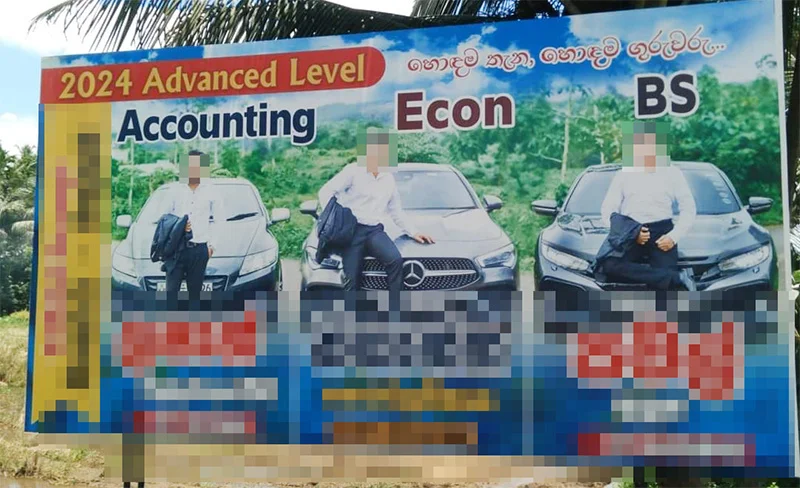
By Anushka Kahandagamage
 Education should be genuinely ‘free’—not just in the sense of being free from privatisation, but also in a way that empowers students by freeing them from oppressive structures. It should provide them with the knowledge and tools necessary to think critically, question the status quo, and ultimately liberate themselves from oppressive systems.
Education should be genuinely ‘free’—not just in the sense of being free from privatisation, but also in a way that empowers students by freeing them from oppressive structures. It should provide them with the knowledge and tools necessary to think critically, question the status quo, and ultimately liberate themselves from oppressive systems.
Education as an oppressive structure
Education should empower students to think critically, challenge oppression, and envision a more just and equal world. However, in its current state, education often operates as a mechanism of oppression rather than liberation. Instead of fostering independent thinking and change, the education system tends to reinforce the existing power dynamics and social hierarchies. It often upholds the status quo by teaching conformity and compliance rather than critical inquiry and transformation. This results in the reproduction of various inequalities, including economic, racial, and social disparities, further entrenching divisions within society. As a result, instead of being a force for personal and societal empowerment, education inadvertently perpetuates the very systems that contribute to injustice and inequality.
Education sustaining the class structure
Due to the widespread privatisation of education, the system continues to reinforce and sustain existing class structures. Private tuition centres, private schools, and institutions offering degree programmes for a fee all play a significant role in deepening the disparities between different social classes. These private entities often cater to the more affluent segments of society, granting them access to superior education and resources. In contrast, students from less privileged backgrounds are left with fewer opportunities and limited access to quality education, exacerbating the divide between the wealthy and the underprivileged. This growing gap in educational access not only limits social mobility but also perpetuates a cycle where the privileged continue to secure better opportunities while the less fortunate struggle to break free from the constraints of their socio-economic status.
Gender Oppression
Education subtly perpetuates gender oppression in society by reinforcing stereotypes, promoting gender insensitivity, and failing to create a gender-sensitive education system. And some of the policymakers do perpetuate this gender insensitive education by misinforming people. In a recent press conference, one of the former members of Parliament, Wimal Weerawansa, accused gender studies of spreading a ‘disease’ among students. In the year 2025, we are still hearing such absurdities discouraging gender studies. It is troubling and perplexing to hear such outdated and regressive views being voiced by public figures, particularly at a time when societies, worldwide, are increasingly embracing diversity and inclusion. These comments not only undermine the importance of gender studies as an academic field but also reinforce harmful stereotypes that marginalise individuals who do not fit into traditional gender roles. As we move forward in an era of greater social progress, such antiquated views only serve to hinder the ongoing work of fostering equality and understanding for all people, regardless of gender identity.
Students, whether in schools or universities, are often immersed in an educational discourse where gender is treated as something external, rather than an essential aspect of their everyday lives. In this framework, gender is framed as a concern primarily for “non-males,” which marginalises the broader societal impact of gender issues. This perspective fails to recognise that gender dynamics affect everyone, regardless of their gender identity, and that understanding and addressing gender inequality is crucial for all individuals in society.
A poignant example of this issue can be seen in the recent troubling case of sexual abuse involving a medical doctor. The public discussion surrounding the incident, particularly the media’s decision to disclose the victim’s confidential statement, is deeply concerning. This lack of respect for privacy and sensitivity highlights the pervasive disregard for gender issues in society.
What makes this situation even more alarming is that such media behaviour is not an isolated incident, but rather reflects a broader pattern in a society where gender sensitivity is often dismissed or ignored. In many circles, advocating for gender equality and sensitivity is stigmatised, and is even seen as a ‘disease’ or a disruptive force to the status quo. This attitude contributes to a culture where harmful gender stereotypes persist, and where important conversations about gender equity are sidelined or distorted. Ultimately, this reflects the deeper societal need for an education system that is more attuned to gender sensitivity, recognising its critical role in shaping the world students will inherit and navigate.
To break free from these gender hierarchies there should be, among other things, a gender sensitive education system, which does not limit gender studies to a semester or a mere subject.
Ragging
The inequality that persists in class and regional power structures (Colombo and non-Colombo division) creeps into universities. While ragging is popularly seen as an act of integrating freshers into the system, its roots lie in the deeply divided class and ethno-religious divisions within society.
In certain faculties, senior students may ask junior female students to wear certain fabrics typically worn at home (cheetta dresses) and braid their hair into two plaits, while male students are required to wear white, long-sleeved shirts without belts. Both men and women must wear bathroom slippers. These actions are framed as efforts to make everyone equal, free from class divisions. However, these gendered and ethicised practices stem from unequal and oppressive class structures in society and are gradually infiltrating university culture as mechanisms of oppression.The inequality that persists in gradually makes its way into academic institutions, particularly universities.
These practices are ostensibly intended to create a sense of uniformity and equality among students, removing visible markers of class distinction. However, what is overlooked is that these actions stem from deeply ingrained and unequal social structures that are inherently oppressive. Instead of fostering equality, they reinforce a system where hierarchical power dynamics in the society—rooted in class, gender, and region—are confronted with oppression and violence which is embedded in ragging, creating another system of oppression.
Uncritical Students
In Sri Lanka, and in many other countries across the region, it is common for university students to address their lecturers as ‘Sir’ and ‘Madam.’ This practice is not just a matter of politeness, but rather a reflection of deeply ingrained societal norms that date back to the feudal and colonial eras. The use of these titles reinforces a hierarchical structure within the educational system, where authority is unquestioned, and students are expected to show deference to their professors.
Historically, during colonial rule, the education system was structured around European models, which often emphasised rigid social distinctions and the authority of those in power. The titles ‘Sir’ and ‘Madam’ served to uphold this structure, positioning lecturers as figures of authority who were to be respected and rarely challenged. Even after the end of colonial rule, these practices continued to permeate the education system, becoming normalised as part of the culture.
This practice perpetuates a culture of obedience and respect for authority that discourages critical thinking and active questioning. In this context, students are conditioned to see their lecturers as figures of unquestionable authority, discouraging dialogue, dissent, or challenging the status quo. This hierarchical dynamic can limit intellectual growth and discourage students from engaging in open, critical discussions that could lead to progressive change within both academia and society at large.
Unleashing minds
The transformation of these structures lies in the hands of multiple parties, including academics, students, society, and policymakers. Policymakers must create and enforce policies that discourage the privatisation of education, ensure equal access for all students, regardless of class dynamics, gender, etc. Education should be regarded as a fundamental right, not a privilege available only to a select few. Such policies should also actively promote gender equality and inclusivity, addressing the barriers that prevent women, LGBTQ+ individuals, and other marginalised genders from accessing and succeeding in education. Practices that perpetuate gender inequality, such as sexism, discrimination, or gender-based violence, need to be addressed head-on. Institutions must prioritise gender studies and sensitivity training to cultivate an environment of respect and understanding, where all students, regardless of gender, feel safe and valued.
At the same time, the micro-ecosystems of hierarchy within institutions—such as maintaining outdated power structures and social divisions—must be thoroughly examined and challenged. Universities must foster environments where critical thinking, mutual respect, and inclusivity—across both class and gender—are prioritised. By creating spaces where all minds can flourish, free from the constraints of entrenched hierarchies, we can build a more equitable and intellectually vibrant educational system—one that truly unleashes the potential of all students, regardless of their social background.
(Anushka Kahandagamage is the General Secretary of the Colombo Institute for Human Sciences)
Kuppi is a politics and pedagogy happening on the margins of the lecture hall that parodies, subverts, and simultaneously reaffirms social hierarchies.
Features
New vision for bassist Benjy
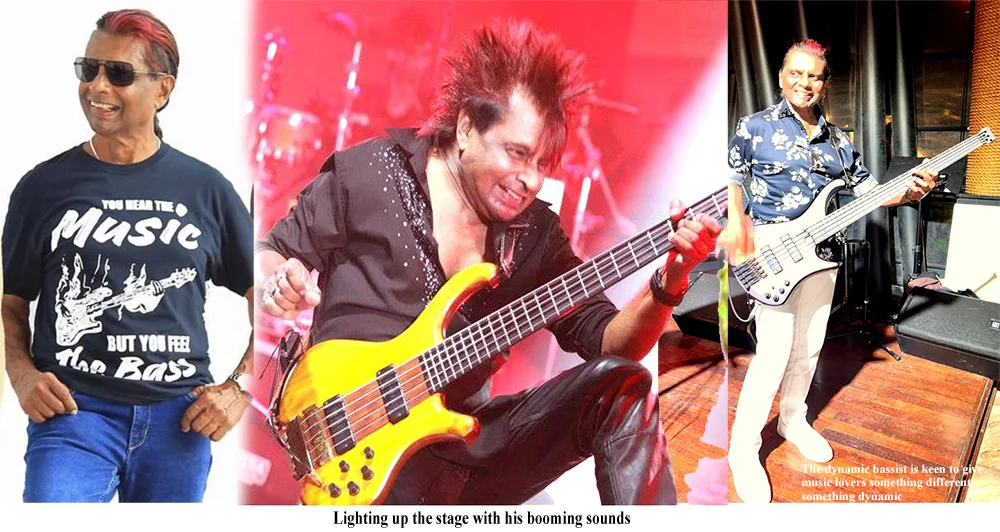
It’s a known fact that whenever bassist Benjy Ranabahu booms into action he literally lights up the stage, and the exciting news I have for music lovers, this week, is that Benjy is coming up with a new vision.
One thought that this exciting bassist may give the music scene a layoff, after his return from the Seychelles early this year.
At that point in time, he indicated to us that he hasn’t quit the music scene, but that he would like to take a break from the showbiz setup.
“I’m taking things easy at the moment…just need to relax and then decide what my future plans would be,” he said.
However, the good news is that Benjy’s future plans would materialise sooner than one thought.
Yes, Benjy is putting together his own band, with a vision to give music lovers something different, something dynamic.
He has already got the lineup to do the needful, he says, and the guys are now working on their repertoire.
The five-piece lineup will include lead, rhythm, bass, keyboards and drums and the plus factor, said Benjy, is that they all sing.
A female vocalist has also been added to this setup, said Benjy.
“She is relatively new to the scene, but with a trained voice, and that means we have something new to offer music lovers.”
The setup met last week and had a frank discussion on how they intend taking on the music scene and everyone seems excited to get on stage and do the needful, Benjy added.
Benjy went on to say that they are now spending their time rehearsing as they are very keen to gel as a team, because their skills and personalities fit together well.
“The guys I’ve got are all extremely talented and skillful in their profession and they have been around for quite a while, performing as professionals, both here and abroad.”
Benjy himself has performed with several top bands in the past and also had his own band – Aquarius.
Aquarius had quite a few foreign contracts, as well, performing in Europe and in the Middle East, and Benjy is now ready to do it again!
-

 Sports2 days ago
Sports2 days agoSri Lanka’s eternal search for the elusive all-rounder
-

 Features6 days ago
Features6 days agoCelebrating 25 Years of Excellence: The Silver Jubilee of SLIIT – PART I
-

 Business6 days ago
Business6 days agoCEB calls for proposals to develop two 50MW wind farm facilities in Mullikulam
-

 Business4 days ago
Business4 days agoAIA Higher Education Scholarships Programme celebrating 30-year journey
-

 News3 days ago
News3 days agoGnanasara Thera urged to reveal masterminds behind Easter Sunday terror attacks
-

 Features6 days ago
Features6 days agoNotes from AKD’s Textbook
-

 News2 days ago
News2 days agoComBank crowned Global Finance Best SME Bank in Sri Lanka for 3rd successive year
-

 Features2 days ago
Features2 days agoSanctions by The Unpunished

